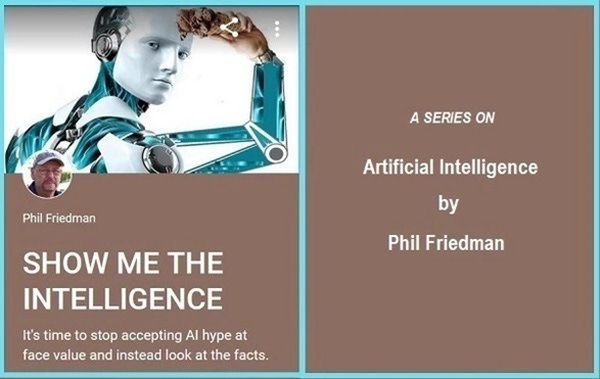Show Me the Intelligence!
AN OVERVIEW OF SEVEN YEARS SPENT IN THE INTELLECTUAL GULAG QUESTIONING THE HYPERBOLIC CLAIMS OF THE PROPHETS OF ARTIFICIAL INTELLIGENCE
It’s time to stop accepting the hype generated by the prophets of artificial intelligence and instead insist on hard existential evidence ...
“Artificial intelligence will reach human levels by around 2029. Follow that out further to, say, 2045, we will have multiplied the intelligence, the human biological machine intelligence of our civilization a billion-fold.”
― Ray Kurzweil, Futurist and Author
“The hype about the rapidly approaching Singularity of Artificial Intelligence comes not so much from the Prophets as from the Profits of AI.”
― Phil Friedman, AI-Skeptic and Author of "Artificial Un-Intelligence"
“A recent article in Forbes loudly purported to provide us with ten powerful examples of artificial intelligence in use today (2017). Unfortunately, not one of the examples cited represents a true instantiation of Intelligence, artificial or otherwise.”
― Phil Friedman, in "Artificial Un-Intelligence"
The operating principle in the promotion of AI seems to be if you say it loudly and often enough, people may believe you...
― Phil Friedman in "The Emperor May Be a Bot ... But He Still Has No Clothes"
"... look, for example, at a driverless car, that's a form of ... modest intelligence … the average 16-year-old can do it as long as they're sober, with a couple of months of training. Yet Google has worked on it for seven years and their car still can only drive ― like on sunny days, without too much traffic."
― Gary Marcus from "The limits of artificial intelligence", Tech Crunch, April, 2017
Let's get real. At 16 years old, 4'9" tall and well under 100 lbs, Mary Lou Retton, could have kicked the ass of the 1,800-pound Boston Dynamics back-flipping "super" robot fifty times over...
― Phil Friedman from "The Robots Are Coming, the Robots Are Coming..."
To read the full series, go to:
1. "Artificial UN-Intelligence"
2. "The Emperor May Be a Bot... but He Still Has No Clothes"
3. "The Robots Are Coming, the Robots Are Coming..."
4. "The Prophets VS the Profits of Ai"
5. "The Anthropomorphization of Ai"
Text Copyright 2017-2023 by Phil Friedman — All Rights Reserved
Image Credits: Phil Friedman and Google Images.com
Note: Earlier versions of the articles by Phil Friedman referred to above appeared variously on beBee.com, ThriveGlobal.com, and Medium.com



Hi Phil,
I'm an information engineer here via Loose Cannon, mainly because I haven't seen a conversation where an information engineer has talked about AI to someone practical, motivated and skeptical with no formal information engineering.
That conversation would seem to me to be the essence of mutual respect in our society as well as critical to the ethics of engineering as a profession, so there's no excuse not to have it. You've talked about the potential benefits of 'volkspublishing', and I think that's one of them.
Yet I don't think that tech journalism is having it -- mainly because I think that tech journalists are largely incapable. Much like sailing journalists, they're packaging a feeling to compete for commercial attention. The audience is expected to follow passively, rather than ask questions. Meanwhile the better science communicators must compete with the 'prophets' (the tech sector has long called them 'evangelists', and the social media sector calls them 'ambassadors') for the same audience attention and there's so much noise that only the hyperbole can be heard.
Call it a fallacy of progressivism, if you like: that the blindly self-interested application of expertise to innovation will naturally improve our social condition. Or call it 'cargo cult' -- the worship of whatever shiny new innovation 'lands' each year, as though from another magical planet. (There's perhaps a parallel in the recreational sailing industry too.)
I think you've reposted these articles because you want a practical conversation about AI function, hype, and potential reach and impact and are frustrated that it's not happening. I think that I may be able to help with that.
For disclosure, I don't work in AI. I work in informatics: the use of information to help us make better decisions. But my PhD was completed in an AI-related field during the Second Wave of AI popularity.
After the First Wave in the 1960s-70s when AI was mainly interesting to theoreticians, the Second Wave was in the 1980s-90s when growing computer power made it interesting to computer scientists. I'd say that we're currently in a Third Wave. Enabled by cloud computing and 'free' Web data, it's now interesting to tech entrepreneurs and tech stock investors for the simple reason that new extractive industries always interest investors -- and I'm in no doubt that like browser search engines and most popular social media, this is another extractive industry.
Meanwhile, I now have clients coming to me asking how AI can help them make better decisions -- which is another way of asking how AI can help them be more intelligent at work.
So: show me the intelligence indeed.
Poke if you'd like to chat.